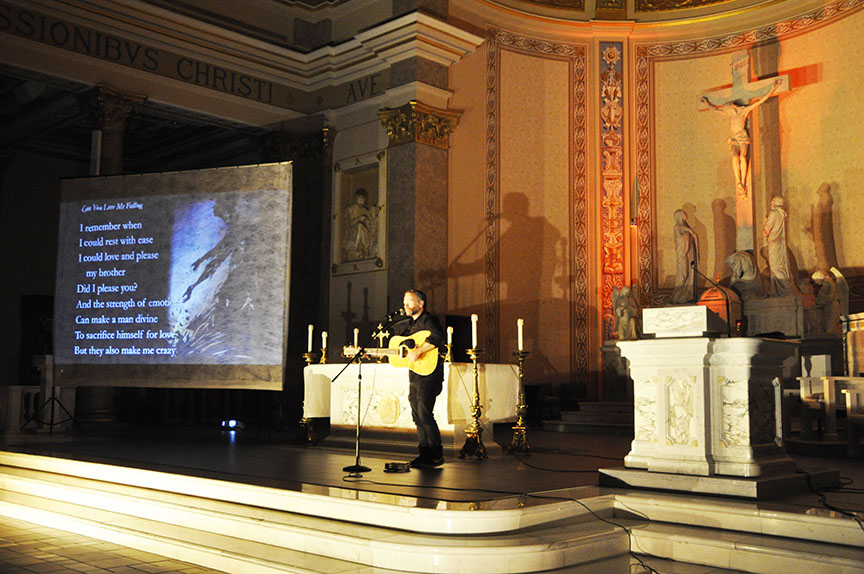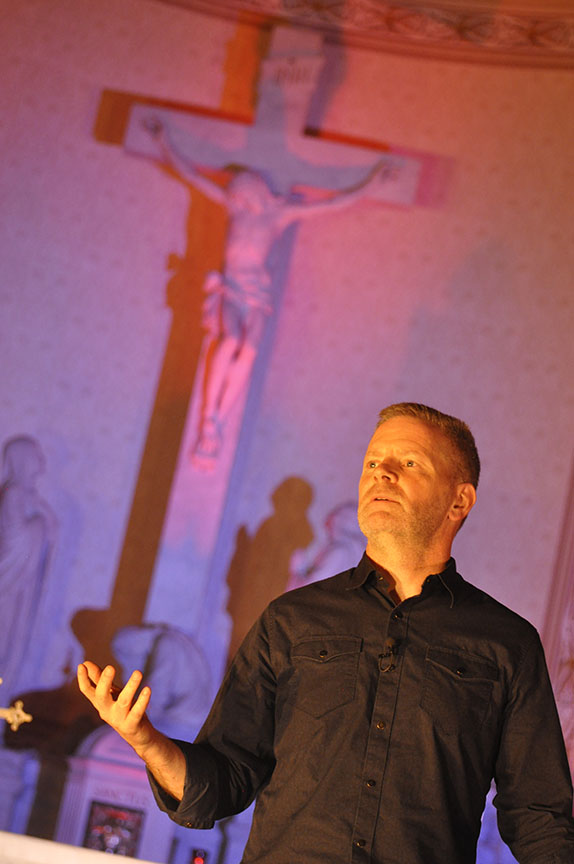
We can look at a person without truly seeing them. But in seeing another we find love, said Dr. Christopher West during his presentation “Made for More: Visions of the Promised Land” on Thursday, Oct. 27, at the Cathedral of the Incarnation.
“The invitation tonight is to open our eyes a little bit and look deeper for something more to see when we encounter a human person,” West said. “The crisis of love in the modern world is a crisis of vision because we look but we do not see.
“To see a person is to love a person,” he said. And, quoting the musical “Les Miserables,” “To love another person is to see the face of God.”
West, with the help of musician Mike Mangione, explained St. John Paul II’s Theology of the Body through talks, music and audiovisuals to hundreds of Catholics who attended the event, which was sponsored by the Theology of the Body Institute in conjunction with the Cathedral, St. Ann Church, and Regnum Christi Nashville, with St. Edward Church also serving as a secondary supporting sponsor.
West is one of the founders of the Theology of the Body Institute and has been its president since 2018. He also serves as a professor of theological anthropology in the jointly sponsored master of arts program with Pontifex University. He has authored several books on St. John Paul II’s Theology of the Body.
“Looking at something stops at the physical,” West said. “We get to the spiritual through the physical, but when you’re merely looking at someone, you stop at the physical and you never get to the inner mystery of the person.
“When we are just looking, the body is treated as some thing, but when we have that deeper vision, the body is respected as someone,” he said.
According to the Theology of the Body, he said, “The body expresses the person in such a way that it makes it clear who the person is and who he or she ought to be.”
When someone simply looks at another person, it separates the soul from the body, West said, essentially killing them, and therefore means they’re being treated as dispensable, replaceable, and repeatable.
The key to seeing, he said, is “to admit we’re blind to some degree.”
“Brothers and sisters, we need new eyes if we are to realize that the true value of the human body lies not to be objectivized, or standardized, or commercialized, but in being personalized, baptized, and even divinized,” he said. “This is what John Paul II’s Theology of the Body supplies.”
Until he discovered Theology of the Body, West said, he was taught that sexual desires are bad, putting him on what he called a “starvation diet.”
“I was 24 years old when I learned for the first time that Christianity is not a starvation diet. It’s an invitation to a banquet, to a wedding feast,” West said. “I came to discover that the Gospel invites us not to repress our desire but to experience the fullness of ‘eros.’
“The purpose of ‘eros’ is to direct our hearts and our bodies upwards towards the true and beautiful, so that what’s erotic also becomes true, good, and beautiful,” he said. “God gave us erotic desires, ‘eros,’ that hunger of our hearts to be like the fuel of a rocket that has the power to launch us to the stars.”

The enemy wants to invert those rockets, turning the ‘eros’ into another Greek word, ‘pornos,’ he said, which is where original sin comes into play.
“I have some good news,” he said. “Christ came into the world not to condemn us for our inverted rockets, but Christ came into the world to redirect our rocket engines to the stars.”
Through the creation of the world and the creation of man, God speaks through sign language, West said.
“We have to learn how to read the sign language,” West said. “The human body is not biological. It is theological.”
“God is life-giving love,” he continued. “He made us in his image and likeness, male and female. He blessed them and said be fruitful because we’re called to generate new life.”
There’s a reason why marriage is the image used more than any other to help us understand the way God loves, he said.
“God wants to marry us,” West said, noting how the earthly marriage of Adam and Eve in Genesis eventually leads to the marriage of Christ and the Church. God’s sign language in this is through the person of Mary.
“Mary is the embodiment of the bride. She literally conceived eternal life in her womb,” he said. “We must learn like Mary to open ourselves to the infinite, so we can receive infinite love and infinite life within us.”
By doing so, we let in the love of Jesus, who truly sees us.
“If we let his loving gaze enter into our wounded hearts then his loving gaze starts to open us up,” West said. “Take the risk and let that love in.”
Physical marriage is a sign and sacrament of a greater spiritual marriage, he said.
“Our destiny is the union of God and the whole human race,” he said. “God is full of ‘eros’ for his bride. … We are that bride and God is waiting on the ‘yes.’”
“Our bodies tell a divine story, but if we’re just looking, we’re not going to see any of this,” West concluded. “If we’re seeing, our bodies have a spousal meaning revealing our ultimate destiny – union with God forever.”









